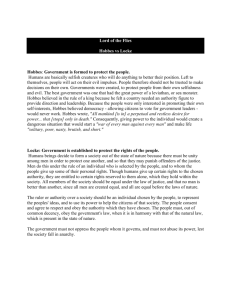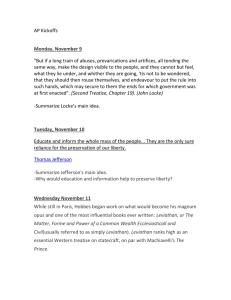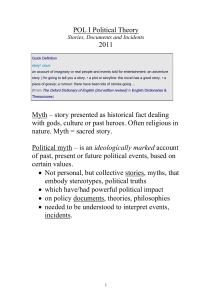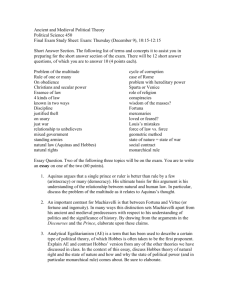Thomas Hobbes - World of Teaching
advertisement
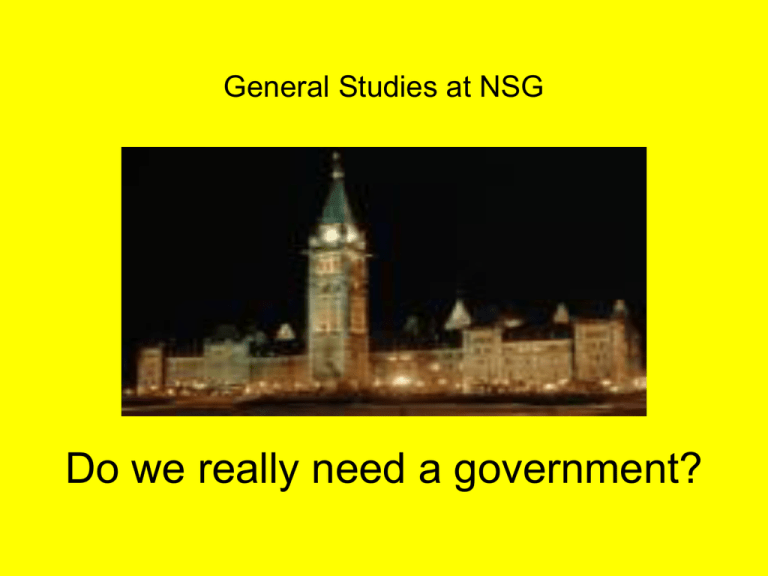
General Studies at NSG Do we really need a government? Thomas Hobbes ‘The Leviathan’ (1651) Friedrich Engels ‘Origins of the Family, Private Property and the State’ (1884) Hobbes’ question • How is social order possible? • Hobbes aimed to produce evidence for why we need a government based on rational argument and evidence without reference to the ‘divine right of kings’ Hobbes’ assumptions: • All men seek to avoid death and injury • Because men want a happy life, they seek sufficient power to ensure that happy life • All men have a ‘restless desire for power’ • This leads to an ‘equality of hope in the achieving of our aims’ Hobbes’ assumptions: • Without a power able to enforce rules, there is chaos and misery • 3 causes of conflict – men fight for gain – men fight for security – men fight for reputation Implications • Everyone is pulled into a constant competitive struggle for power • the natural state of man is a war of all against all (‘the state of nature’) • People are insecure, and live in a constant fear of injury and death • There is no place for industry in the state of nature, because the fruit of it is uncertain. Hence, no agriculture, navigation, building, culture, science • Life in a state of nature is "solitary, poor, nasty, brutish, and short" Hobbes’ evidence to support his assumptions The fact that people lock their doors provides support for Hobbes’ view that people are naturally inclined to fight each other. Hobbes’ solution • Under these conditions, how can social order be achieved? • In the state of nature, people have liberty • Since man is rational, he will never use his power to harm himself • Man will try to achieve peace only if he is convinced that everyone else will do the same How to make sure that everyone would seek peace? • No use for everyone to merely agree to give up their individual freedom and power (‘sovereignty’) because people would cheat whenever it was to their advantage • They would have to transfer power to some sovereign state (‘the Leviathan’) which could make an agreement stick by having the authority to maintain order and use force against all lawbreakers Hobbes’ conclusion: Government is necessary if : • People are not to live in a state of nature • People are to pursue individual happiness • People are to engage in industry and commerce • People are to sleep safely in their beds Engels’ question: What are the origins of the state? Assumptions: • Before the development of private property there was no need for a state • People lived in cooperative groups in ‘primitive communism’ N.B. Anthropological evidence seems to support Engels’ not Hobbes’s assumptions Engels (1820-95) on the state • Like Hobbes, Engels’ views the state as necessary for social order • However, for Engels the state´s role is different – It creates social order by regulating conflict between competing classes – The state functions to benefit the whole of the ruling class by maintaining the status quo at the expense of the ruled How do Marx and Engels define classes? • Classes are by their relation to the means of production: – Owners and controllers of the means of production ( ‘bourgeoisie’ ) – Non-owners of the means of production who have ‘nothing to sell but their labour power’ (‘proletariat’) How the state produces social order • It represents the interests of the ruling the bourgeoisie as against the proletariat through: laws, coercion, force, ideology, religion, education, mass media, social division, individualism, consumerism, competition Under communism, however • The state will ‘wither away’ • Production will take place to meet the needs of everyone rather than to make profits for a ruling minority • Cooperation will prevail • No need for war (nor locking your door) Conclusions • Hobbes sees the state as representing everyone’s interests, it is therefore an agency for peace • Engels sees the state as representing the interests of the ruling class, it is therefore a tool in class conflict This powerpoint was kindly donated to www.worldofteaching.com http://www.worldofteaching.com Is home to well over a thousand powerpoints submitted by teachers. This a free site. Please visit and I hope it will help in your teaching
